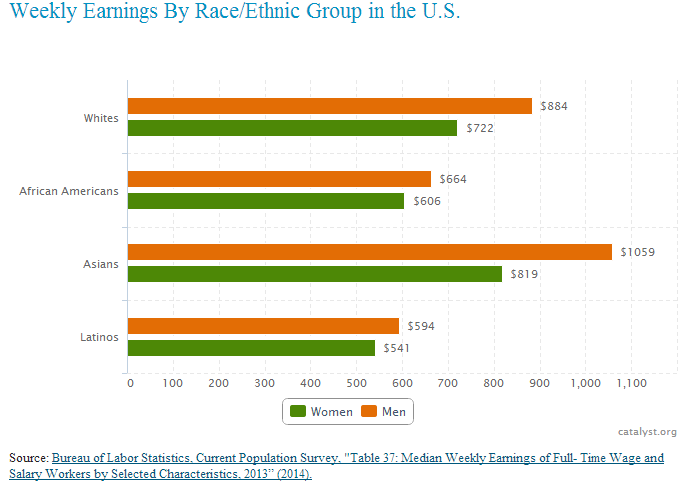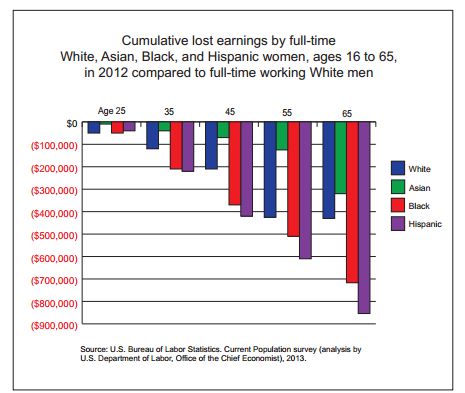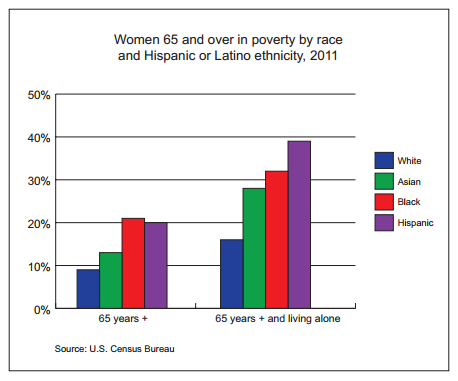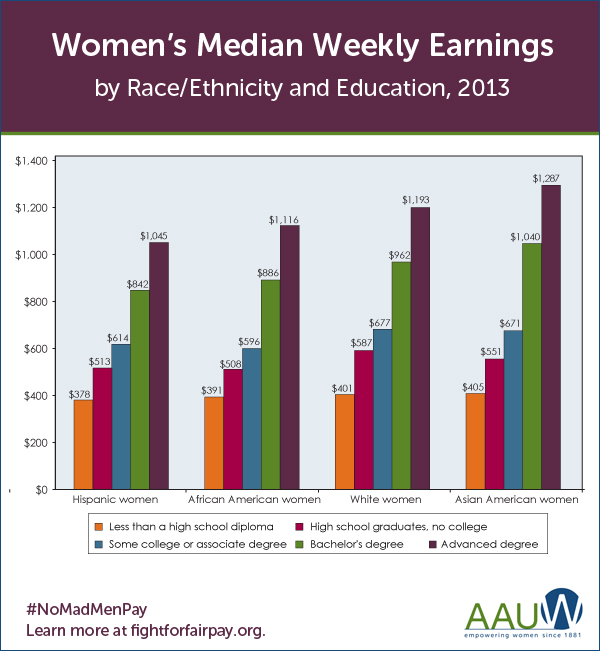Living below the poverty level is the harsh reality for over 40% of Latina-headed households, according to the National Partnership for Women & Families “Latinas and the Wage Gap”. The disparity in earnings is crushing their families: Latinas working full time earn an average of 54 cents for every dollar that a white, non-Hispanic man makes. The lower wages also affects 40% of the married Latinas who bring in half or more of the household income. In some states the pay gap is wider and thus more painful, as in New Jersey where they typically earn a meager 43 cents for every dollar their white, non-Hispanic male counterparts are paid. How does your state and Congressional District rank?
Women on average earn 77 cents for every dollar paid to men (a recent report states that women working for the Obama Administration are paid less than 87 cents for every dollar that their male co-workers make). However, Latinas are making less, as noted below by Catalyst, based on information from the Bureau of Labor:
California, the state with the largest Latino residents, Latinas comprise 37% of the female population and make up 54% of the women living in poverty – which typically means also having the least amount of education. In a state where female immigrants outnumber the men, The Economic Status of Latinas report has outlined economic policy recommendations to assist communities achieve equality by, among many suggestions, providing job development training, reviewing the existing wage gap and ensuring that Latinas are paid fairly for their work, increasing grants for female students seeking higher education and creating retirement programs for all income levels. The report further states “despite many opportunities for improvement, current trends demonstrate that Latinas are positioned to have increasingly stronger impacts on political, business, education and government sectors across the state and the nation.”
In the Economic Status of Women of Color, the Department of Labor estimates that throughout a Latina’s lifetime, the difference in pay amounts to about $854,000. This loss of income affects their household as there is less money available for education, food, housing, childcare, and other basic necessities. It is an economic issue that affects the entire family.
Due to the loss of income created by the disparity in salaries, Latinas will likely collect less from Social Security and pensions (if available), have less investments and money in the bank for their retirement years.
“Marta gets her Master’s and lost her Mister“
Cultural differences exist for some first generation U.S. Latinas entering the workforce and seeking higher education, as noted in Episode 12 (Juana Gets Smart) of ¿Qué Pasa, U.S.A.?a bilingual situation comedy about a multi-generation Cuban-American family living in Little Havana (Miami, Florida), and filmed in the late 1970’s. This particular program pokes fun at the “machismo” mentality of the stereotypical (and old fashioned) Hispanic male. Juana is encouraged by her boss to attend night school and acquire accounting skills in order to be promoted to bookkeeper. The new position would come with a pay raise – she would now make more money than her husband, Pepe. When Juana announces that she will be going to night school to get her bookkeeping certification, her father informs her that “Marta got her Master’s and lost her Mister“. Juana’s parents live with her, Pepe and their two teenage children. She persisted, received her certification and salary increase and as an added bonus, in the process started a paradigm shift in the Latino community.
College educated Latinas are also facing the wage gap, as noted in a study by NerdScholar. About 2 million women earned a degree of higher education in 2010 versus 1.3 million men, but they are earning 82% of what men earn, according to NerdScholar. Another study conducted by Ohio State University and co-authored by Professor Rachel Dwyer, finds that “at least early in their careers, women suffer more than men if they don’t have a college degree”. Well, Marta, looks like you better go for that Master’s degree after all.
Education matters, as the research from “The Simple Truth about the Gender Pay Gap” demonstrates:
Education helps close the pay gap, but it isn’t the whole story.
Women are Economic Assets
“Women are the most underutilized economic asset in the world’s economy,” says Angel Gurría, the secretary-general of the Organisation for Economic Co-operation and Development. We live in the richest, most powerful country on earth. Immigrant families, like mine and millions others, risk their lives, they leave behind their loved ones and their homeland, for the promise of a better life. Why? Because this is the land of opportunity. We are here to work hard, make sacrifices and provide our children and future generations with the American dream. We can bolster the economy if and when we are paid fair wages.
Latinas are making decisions for major purchases in their homes, Nielsen says in their Latina Power Shift report. We (Hispanics) are 52 million strong and have a collective purchasing power of $1.2 trillion. According to Nielsen’s research “Hispanic women are a key growth engine of the U.S. female population and are expected to become 30 percent of the total female population by 2060.” Apparently marketers are closely following our purchasing habits and they now realize that we are the driving force in our homes.
As we pursue higher education and some of us become “empresarias” (entrepreneurs), we need to have our voices heard (with our votes) and push legislators to make serious economic policy changes so we can all live the beautiful American dream.
Let’s eliminate the rampant wage disparities. So I ask, ¿Qué Pasa, USA?
 Vilma Betancourt-O’Day is the 2013 Co-Secretary of Metropolitan Business and Professional Women North Carolina and founder of Women Wrule, Mujeres Mandan, an organization focusing on helping Women and Minority Owned Micro and Small Businesses achieve M/W/SBE Certifications and grow their business through Government Contracting and Supplier Diversity Programs. She is a Cuban exile and Naturalized US Citizen; her husband, children, grandchildren and Shih Tzu, Cocoa Chanel, rock her world.
Vilma Betancourt-O’Day is the 2013 Co-Secretary of Metropolitan Business and Professional Women North Carolina and founder of Women Wrule, Mujeres Mandan, an organization focusing on helping Women and Minority Owned Micro and Small Businesses achieve M/W/SBE Certifications and grow their business through Government Contracting and Supplier Diversity Programs. She is a Cuban exile and Naturalized US Citizen; her husband, children, grandchildren and Shih Tzu, Cocoa Chanel, rock her world.
vilma@mujeresmandan.org




